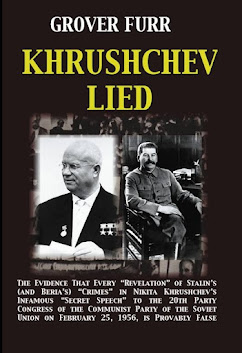Khrushchev Lied, first published in 2011, is definitely the most emblematic work of Grover Furr, an American Professor of Medieval English Literature at Montclair State University who has devoted years of research on Stalin-era Soviet Union.
Before going to the book itself, it is significant to underline that Furr isn't an ordinary historian who relies on the dominant narratives and “sacred truths” of bourgeois historiography. On the contrary, he carefully challenges those narratives and “truths”, applying a dialectical approach on history and seeking for the actual facts one by one, usually using an enormous list of thoroughly-searched, primary and secondary, sources.
The accusations that Khrushchev launched against Stalin and other leading figures of the USSR - such as, for example, Lavrentiy Beria - were skillfully utilized by the bourgeois staffs of the West, within the the context of the Cold War, for the massive discrediting of the existing socialism of the 20th century. Furthermore, through the polemic against the Stalinist period, Khrushchev and his close associates justified a series of decisions taken at the 20th Congress, which in essence constituted the opportunist turn of the CPSU and the subsequent abandonment of socialist construction. After all, the 20th Congress of the CPSU was the key point in the USSR's gradual path towards capitalist restoration, which was openly manifested with the counterrevolutionary upheavals in the late 1980s.
In his book, Grover Furr examines Khrushchev's accusations against Stalin one by one, using extensive documentary evidence drawn from newly accessible Soviet primary sources. The fundamental conclusion of the book is, to say the least, striking: Not a single one of Khrushchev's allegations against Stalin is confirmed. On the contrary, according to the evidence presented in detail by Furr, Khrushchev deliberately lied, sometimes concealing historical facts and sometimes distorting them. Khrushchev Lied doesn't reveal that Nikita Sergeyevich simply exaggerated or misrepresented the so-called “Stalin's crimes” but that Khrushchev knowingly lied, fabricating false narratives to shift blame, discredit Stalinist policies and consolidate his own power.
One could argue that Furr is biased against Khrushchev or that he is trying to exonerate Stalin from the accusations against him. This does not seem to be the case in this book. Furr quotes the excerpts from the "Secret Speech" verbatim and then proceeds to refute the Soviet leader's arguments step by step. Chapter by chapter, the author unravels the tangle of Khrushchev's lies, using a vast array of historical sources, both Russian and Western. Even if someone has reservations about the author's methodological approach, the outcome is truly impressive. The evidence presented by Furr seems indisputable and the impression the reader gets is that Nikita Khrushchev was, indeed, a shameless liar. However, he was not born a liar, nor a revisionist, nor a traitor to the cause of socialism-communism. Khrushchev, like other leaders like him, was the product of an era and a process that deserve to be studied even more extensively, so that relevant conclusions can be drawn about the past, present, and future of the communist movement.
The demonization of Stalin and the attempt to slander the Stalinist period has been and continues to be the forefront of anti-communism internationally. The "evil and bloodthirsty dictator" Stalin has been the necessary bogeyman for the imposition of the anti-communist campaign, from the end of the Second World War until today. If there is no bogeyman, the fairy-tale collapses.
Ultimately, the defense and restoration of historical truth is not simply a moral duty of those who care about it. It is a source of important lessons for the past, the present and future of class struggle, the struggle for a better society without the exploitation of man by man.
* Nikos Mottas is the Editor-in-Chief of In Defense of Communism.


